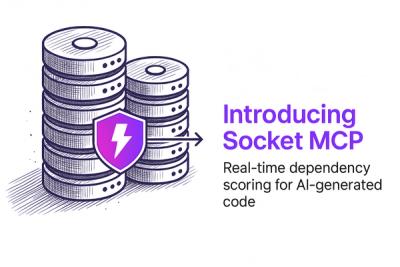
Product
Secure Your AI-Generated Code with Socket MCP
Socket MCP brings real-time security checks to AI-generated code, helping developers catch risky dependencies before they enter the codebase.
Proxy for Wormly.com's health monitoring to enable monitoring of machines that are behind firewalls or where you don't want to run Wormly's HTTP and PHP-based monitoring script. Requires only Ruby on the proxy server and nothing at all on the machines being monitored when the SSH-based back-end is used.
Configuring Slugly is simple! Simply create a config.yaml like the example shown below.
Slugly needs to know where to listen for incoming HTTP requests. The host
and port entries are for telling Slugly where it should be listening for
Wormly.com's health monitoring polls.
The wormly_key is your Wormly.com API key. This key is used for enabling and
directing Wormly.com's Linux health monitoring polls to the Slugly URLs for
that host.
Slugly serves up health information for each node according to the nodes
entry in the configuration file. A node entry consists of:
path specifying the URL where this health monitoring information should
be found.wormly_id for this node.provider for gathering the health-related metadataoptions required by this provider.Specifying a valid wormly_key together with a wormly_id for a given node
will cause Slugly to attempt to notify Wormly.com that health data is
available at the corresponding Slugly URL. If either is omitted, invalid, or
if the Wormly.com API call fails, Slugly will still host metadata for this
node. However, Wormly may be unaware unless a successful API call is made by
other means.
Currently, there are two providers available:
HealthProvider which provides metadata for the local machine.SSHHealthProvider which gathers health metadata from a remote
Linux machine by way of SSH.The SSHHealthProvider takes two additional options: the hostname of the
target machine and a username of a user on that machine. Slugly assumes that
password-less SSH is configured between the user running Slugly and the host
identified by hostname.
host: publichostname.com
port: 8088
wormly_key: 1Xs3cr3tk3ys
nodes:
- path : /ssh
wormly_id : 12345
provider : SSHHealthProvider
options:
hostname: localhost
username: ubuntu
- path : /local
wormly_id : 67890
provider : HealthProvider
It's just slugly -c /path/to/myconfig.yaml. What could be simpler than that?
Slugly does not store passwords. Password-less SSH is required for use of the SSHHealthProvider.
Slugly is a work in progress, and is not quite yet ready for use in a production environment. In particular, the current version of Slugly has two security-related weaknesses:
The current version of Slugly does not have SSL enabled
Slugly does not require that the Wormly.com supplied password be present or correct. As a result Slugly openly provides health related metadata to any and all who request it.
FAQs
Unknown package
We found that slugly demonstrated a not healthy version release cadence and project activity because the last version was released a year ago. It has 2 open source maintainers collaborating on the project.
Did you know?

Socket for GitHub automatically highlights issues in each pull request and monitors the health of all your open source dependencies. Discover the contents of your packages and block harmful activity before you install or update your dependencies.

Product
Socket MCP brings real-time security checks to AI-generated code, helping developers catch risky dependencies before they enter the codebase.

Security News
As vulnerability data bottlenecks grow, the federal government is formally investigating NIST’s handling of the National Vulnerability Database.

Research
Security News
Socket’s Threat Research Team has uncovered 60 npm packages using post-install scripts to silently exfiltrate hostnames, IP addresses, DNS servers, and user directories to a Discord-controlled endpoint.